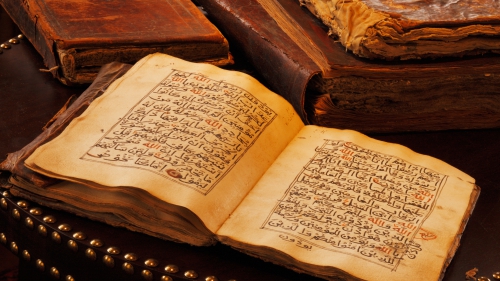Faith Based on Submission

In the name of God, the Lord of Grace, the Most Merciful
Alif. Lam. Mim. The revelation of this Book comes, beyond any doubt, from the Lord of all the worlds. (Quran Prostration, Al-Sajdah: 32: 1-2)
This surah, a Makkan revelation, presents the faith, which the Qur'an wants human nature never to overlook. This is the faith based on submission to God, the One, the Creator of life, man and the universe, who conducts all affairs and controls all beings, wherever they are. It also requires belief in the message of Muhammad to whom the Qur'an has been bestowed from on high to guide people to their Lord. Another essential ingredient of this message is belief in resurrection, reckoning, judgment and reward.
Indeed all the surahs revealed in Makkah deal with this main issue, but each has its own approach and uses its own special effects. Nonetheless, all converge to address the human heart with the knowledge of the One who knows all, including what hearts and minds may harbor and conceal. He further knows the nature of hearts, what affects them, how they feel and react in all situations.
This surah deals with this issue of faith in a totally different way to that followed in the preceding surah, Luqman. It presents the whole issue in its opening verses, while the rest of the surah provides notes and touches that awaken hearts and souls, calling for contemplation and reflection. It also provides evidence and proof derived from what is in the universe, and the origins of man and how he develops. It presents scenes from the Day of Judgment which are full of life, and it refers to the fates of earlier communities whose ruins provide further evidence if only people would contemplate this. The surah draws pictures of believers and how they worship and aspire to meet their Lord, contrasting these with stubborn unbelievers. It shows the end of both groups and their rewards as though this is taking place now before our very eyes.
In this way, the surah presents the human heart with what it needs to reflect, contemplate, fear the consequences of, aspire to and hope for. It warns, persuades and convinces. At the end, it leaves man to choose his way and await his destiny having been given all the information and guidance it needs to make an enlightened choice.
In its presentation of this issue, the surah can be divided into four or five related sections. It begins with the three separate letters, Alif, Lam, Mim, to indicate that the revealed book is composed of letters like these. It removes all doubt about its being revealed by God "the Lord of all the worlds." (Verse 2) It poses a rhetorical question that wonders at the unbelievers' claim that the Qur'an was invented by the Prophet. It follows this with an assertion that it is the truth revealed to him so that he can warn his people in the hope "that they may be guided." (Verse 3) This is the first issue of faith: the issue of revelation and the fact that the Prophet tells the truth as he delivers the message of the Lord of all the worlds.
The surah then speaks about Godhead and its manifestations in the universe: the creation of the heavens and the earth and all that is in between them, control of the universe, how matters in the heavens and the earth are conducted, the reference of all things to Him on the Day of Judgment, as well as the creation of man - his origin, stages of development, and his acquisition of sight, hearing and understanding. Yet rarely do people give thanks. This is the second issue, detailing attributes of the Godhead: creation, control, kindness, benefaction, knowledge, mercy and grace. They are all mentioned in the verses speaking about creation.
The third issue is that of resurrection and destiny. The surah provides a firm answer to the unbelievers' doubts about being resurrected after having been buried and lost in the earth: "They say: What! After we have vanished into the earth, shall we be (restored to life) in a new act of creation?" (Verse 10)
The surah then presents a scene from the Day of Judgment "when those evildoers will hang down their heads before their Lord." (Verse 12) At that time they will declare their certainty of the hereafter and their belief in the truth of the Islamic message. They will say the word which, had they said it in this life, would have opened up for them the gates of heaven. However, in their position on that day it is of no use to them. This scene is shown so that, perchance, it will encourage them to say this word now.
In juxtaposition with this miserable image, the surah shows the believers in this life who, whenever they are reminded of their Lord's signs, "fall down prostrating themselves in adoration, and extol their Lord's limitless glory and praise; and who are never arrogant; who drag themselves out of their beds at night to pray to their Lord in fear and hope; and who are charitable with what We provide for them." (Verses 15-16) This is an inspiring image, followed by another showing what God has prepared for such believers of happiness that exceeds all that people can imagine: "No one can imagine what blissful delights have been kept in store for them as a reward for what they used to do." (Verse 17) The surah then shows briefly the fates of believers and unbelievers, in heaven and hell respectively. It warns the wrongdoers about God's punishment on earth, prior to their more severe punishment in hell.
Then follows a reference to Moses and the unity between his message and that of Muhammad . It shows how the believers among his people persevered in advocating the divine faith in the face of adversity. It mentions that God made them leaders because of their perseverance. This reference gives a clear message to the advocates of Islam to remain patient in adversity and to persevere despite all the opposition they face.
The surah then takes us on a quick round of the fate of earlier communities and how they used to go about their business, oblivious to the truth. It also shows us how dead land is brought to life when rain falls over it. In this way, the two contrasting images of ruin and life are depicted side by side in just a few lines. The surah then concludes by reporting on their question: "When will this judgment be." (Verse 28). This is asked to express doubt about the day when warnings will come true. The answer given warns them of the grievous suffering that this day brings. The Prophet is also directed to leave them to their inevitable and sorry fate.
Sayyid Qutb was an Egyptian intellectual author, associated with the Egyptian Muslim Brotherhood. He is best known for his work on redefining the role of Islam in social and political change, particularly in his books Social Justice and Ma'alim fi-l-Tariq (Milestones). His extensive Quranic commentary Fi zilal al-Qur'an (In the shades of the Qur'an) has contributed significantly to modern perceptions of Islamic concepts.

















